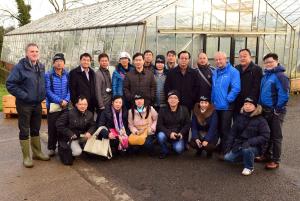AFBI raising grass seed yields
Date published:
Representatives from the British Association of Seed Producers recently visited the Agri-Food and Biosciences Insitute (AFBI) Forage Grass Breeding Programme at Loughgall to examine the novel techniques AFBI scientists are utilizing to produce varieties with high seed yield.

When choosing grass varieties for a reseed, the Recommended Lists published throughout the UK and Ireland provide detailed information on the yield, disease resistance, heading date and nutritive quality to suit individual requirements. In Northern Ireland, varieties bred by AFBI and marketed via Barenbrug UK Ltd, are produced under local weather and soil conditions and therefore particularly suited for use in Northern Ireland. For example AFBI varieties at the top of the Recommended List, such as Fintona, produce in excess of 16.5 tonnes dry weight per year for silage.
However, a characteristic that many farmers won’t be familiar with is seed yield - the amount of seed produced per hectare. The breeding procedure for new varieties commences with the selection of superior ‘mother’ plants, with attention paid to seed yield as well as important agronomic characteristics such as herbage yield and quality. Selected plants are eventually inter-pollinated to synthesise a new variety. An increasingly important aspect of the breeding process is identifying varieties with good seed yield, as this ultimately has a major impact on seed price.
Seagoe is a prime example of an AFBI-bred tetraploid variety which gives excellent forage yield and also has particularly high seed yield. In commercial seed production in England, under contract to Barenbrug UK Ltd, Seagoe has produced over 2.4 tonnes of seed per hectare, which is 50% above the average for perennial ryegrasses.
The British Association of Seed Producers represents farmers in the UK who are involved with commercial seed production. Recently 10 of their members, who have a particular interest in grass seed production, visited the AFBI Forage Grass Breeding Programme at Loughgall to see the novel techniques AFBI scientists use to maximise seed production whilst maintaining herbage yield. The visitors saw the spaced plants trials that contain 20,000 individual grass plants. They were given a demonstration of the measurements taken to ensure that AFBI varieties are commercially viable with a high level of seed production. This in turn will drive down seed production costs whilst maintaining high herbage yields and nutritive quality to maximise herbage production. Several of the visiting seed growers already produce considerable tonnages of AFBI- bred grasses which are ultimately shipped to Northern Ireland and many other grass growing regions within Europe.
Farmers should use the Recommended List as an aid to selection of the most suitable forage grass varieties when re-seeding.
Notes to editors:
AFBI carries out high quality technology research and development, statutory, analytical, and diagnostic testing functions for DARD and other Government departments, public bodies and commercial companiesAFBI's Vision is “Scientific excellence in Northern Ireland … … serving the world” All media enquiries to AFBI Press Office